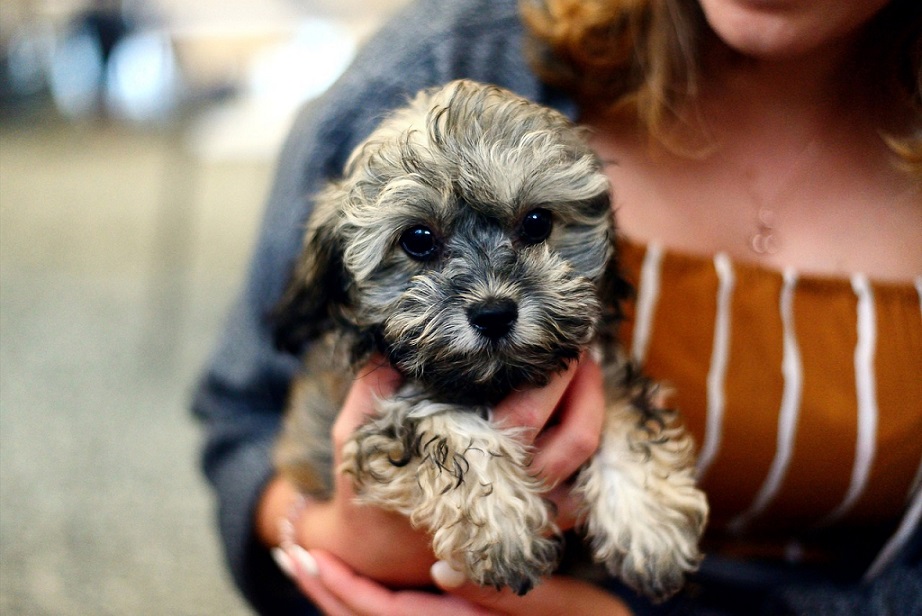Planning to get a Shih Poo dog and have concerns about the breed’s health-related issues. Keep reading to know more about Shih Poo’s health.
Shih Poo is a small-sized loving hybrid dog that is a cross between Shih Tzu and Miniature Poodle. Also known as Shoodle and Pooshih, it is a low-shedding breed. It is an intelligent breed with friendly behavior and playful nature. It does really well with its owners.
If you have decided to get a Shih Poo puppy and looking for health-related issues with this breed, look no further. Because, in this post, you’ll find everything related to Shih Poo’s health and diseases.
So, let’s find out more about Shih Poo’s health below.
Table of Contents
Common Inheritance Diseases from Each Parent
From Poodle:
Although all the dogs may get common diseases and viruses (if not vaccinated) such as parvovirus, certain diseases are specific to certain breeds. Similarly, Poodles may develop various health conditions. Some of the most common conditions that a Shih Poo puppy may inherit from the Poodle are:
- Eye problems
- Patellar Luxation
- Hypothyroidism
- Diabetes
- Cushing’s Disease
- Progressive Retinal Atrophy
- Sebaceous Adenitis
From Shih Tzu
Overall, Shih Tzu is a healthy breed, still, it may develop some health conditions, and most of them are because of its small size. Some common diseases a Shih Poo puppy can inherit from the Shih Tzu are:
- Patellar Luxation
- Dental diseases
- Breathing problems
- Several eye conditions (PRA, corneal dryness, cataract, and retinal detachment)
You may like reading about Hanging Tree Cattle Dog
Shih Poo Health Issues and Treatments
Hip Dysplasia
If you have been dealing with dogs for a long time, “Hip Dysplasia” is a word you would never like to hear. It is a skeletal disease that occurs due to the malfunction of the dog’s hip joint. Mostly, large-sized dogs develop this painful condition but smaller dogs may also get it.
A Shih Poo may inherit this genetic disease from Poodle so it is always better to check with the breeder for the parents’ health documents. All the dogs must be checked for hip scores before breeding. Also, if your dog refuses to exercise or walk suddenly, you should see your vet urgently.
Treatment of hip dysplasia
There are several treatment options for hip dysplasia such as joint supplements, physical therapies, medications, and joint fluid modifiers. Additionally, there are various surgical options available to treat hip dysplasia. It all depends on the severity of the condition and the vet would figure out how should it be treated.
Patellar Luxation
Patellar Luxation or Kneecap Dislocation is a common disease in which the dog’s kneecap is dislocated from its normal position. Then it takes a few minutes to get back to the normal position and the pup may hold its hind legs till then.
Many small-sized breeds such as Mini Bernedoodle, Chihuahua, Pomeranian, and Boston Terrier can develop Patellar Luxation. Being a small-sized dog, the Shih Poo may also get Patellar Luxation.
To understand more about patellar luxation, watch this video.
Treatment of patellar luxation
There are several ways to treat patellar luxation in dogs that depend on the grade of the disease. Usually, Grade, I and Grade II are treated through medications while the Grade III and Grade IV instances are treated through surgeries.
Sebaceous Adenitis
Sebaceous Adenitis is a rare skin disease that is found in specific dog breeds, as well as, horses, rabbits, and cats. The dog breeds that are more likely to develop Sebaceous Adenitis are Standard Poodle, Samoyed, Vizsla, and Akita. So, the Shih Poo may inherit it from its Poodles.
Sebaceous Adenitis is a skin disorder that occurs when an inflammatory disease affects the Sebaceous Glands (the glands responsible for producing and secreting natural skin oils). The damage of the Sebaceous Glands causes Sebaceous Adenitis that results in hair loss, dandruff, moth-eaten appearance to the coat, and nodular skin lesions. The exact reason for this skin disease is unknown yet.
Treatment of sebaceous adenitis
Unfortunately, there is no cure for Sebaceous Adenitis and the affected dogs may need to be treated for their whole life. You may need to use antiseptic and antibiotic shampoos, anti-inflammatory therapy, or some common dietary supplements such as Vitamin A and Omega-3 fatty acids, etc.
Progressive Retinal Atrophy
Progressive Retinal Atrophy is a group of genetic diseases of the retina in dogs, commonly in some specific breeds of dogs such as Cardigan Welsh Corgi, Poodle, Mastiffs, Siberian Husky, etc. Shih Poo inherits it from Poodles and it may lead to blindness.
Also known as PRA, Progressive Retinal Atrophy is a painless disease but your dog’s living style may be badly affected. If you feel your Shih Poo or any other dog feels difficulty seeing, missing treats, or bumping into walls, you must get them checked by a vet.
Treatment for PRA
Unfortunately, there is no cure for PRA at the moment. The best way to prevent other dogs from getting this cursed disease is to avoid breeding the dogs that already have PRA in their genes.
Related: How to take care of blind and deaf dogs
Gum Diseases
Poor dental hygiene, plaque and tartar, loose teeth, and bad breath are among some of the dental diseases a Shih Poo may get. Dental diseases are common in Shih Tzu, therefore their puppies are also prone to them.
It is highly recommended to brush your pup’s teeth regularly to avoid various oral and dental diseases and keep a tight check on them. These diseases can later lead to some serious health conditions and can even affect the heart, liver, lungs, and kidneys.
Treatment
Prevention is better than cure. If you take care of their oral health from an early age and make it a habit, it will benefit them a lot later in their adulthood. Along with that, It is also highly recommended to visit the vet regularly. If somehow your Shih Poo dog develops such conditions, you should take him to the vet ASAP to get them treated as per the severity of the condition because there are several stages of periodontal diseases.
Keratoconjunctivitis Sicca (KCS)
Keratoconjunctivitis Sicca is a common condition of the cornea in dogs which is also known as “Dry Eye”. It causes when microscopic tear glands of the eyes are damaged and do not lubricate the cornea of the eye. It results in inflammation and irritation, and your pups may hold their eyes shut to avoid irritation. Keratoconjunctivitis Sicca may also reduce your dog’s vision if the conditions are severe and not treated well.
Treatment of KCS
There are a couple of ophthalmic medications that help stimulate tear production, and if consistently used, they improve dramatically.
Final words:
So, these were the six most common health-related issues a Shih Poo may develop. To avoid most genetic issues and diseases, it is recommended to get a Shih Poo puppy from a reputable Shih Poo breeder and ask for the health certificates and other necessary information before you get a dog.
Recommended read – All About Irish Doodle










